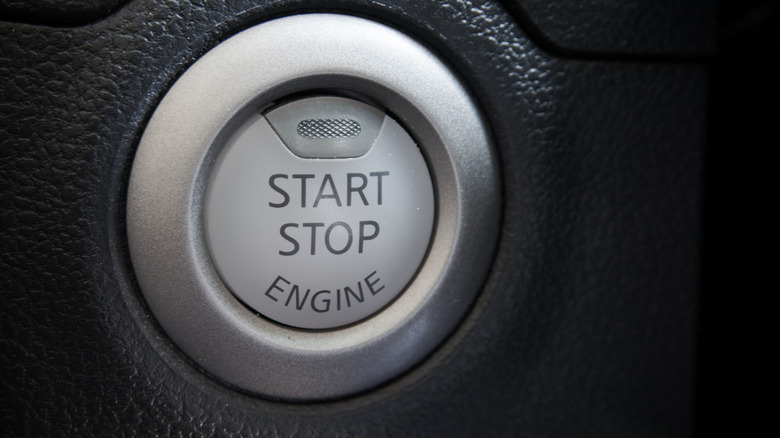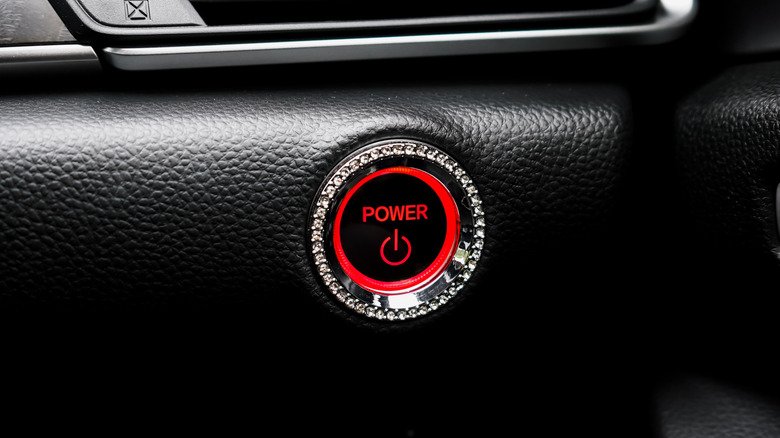Most Drivers Hate This Feature, And It Looks Like It's Finally Going Away
The automatic start-stop system on modern automobiles comes with all the good intentions, but it can be annoying, as well. Research suggests that completely shutting off the car (even for brief spells, like a traffic signal) offers tangible benefits, but at the same time, non-standardized implementation and turning off features such as the AC unit can be a pain. It seems the Trump administration is going to get rid of the auto start-stop system in cars, for good.
Earlier today, Lee Zeldin, a cabinet member and Administrator of the Environmental Protection Agency, announced that the agency will soon get rid of the controversial system. "EPA approved it, and everyone hates it, so we're fixing it," Zeldin wrote in a post on X, formerly known as Twitter. Zeldin didn't go into details about when the feature will go away or whether there are any technical considerations behind phasing it out.
For now, we are awaiting comments from automobile brands, environmental advocacy groups, and industry bodies on the net impact of removing the auto-stop mechanism from passenger vehicles. The move, however, is definitely going to stir some debate because automakers often paraded this feature as their commitment towards environmental goals, while critics questioned whether it's making any practical difference, if at all. It's also worth noting here that the system isn't a regulatory mandate and car brands can choose to implement it at their own discretion, and in whatever technical fashion they deem fit for their cars.
What is the fuss all about?
Technically, the system is known as Automatic engine shut down/start up (AESS), and it's a part of the EPA's Idling Reduction for Locomotives commitment. The overarching goal is to reduce fuel burnout and the associated costs, bring down the maintenance burden by reducing natural operational wear, enhance the engine's lifespan, cut down on noise emission, and most importantly, tone down the dumping of pollutants in the environment.
The agency recommends multiple idling strategies for propulsion engines, such as installing fuel-operated or direct-fired heaters, installing an auxiliary generator for thermal and electrical power, creating a shore connection system (SCS), and an automatic engine start-stop pipeline. The core goal of these idling tactics, however, is to bring down the emission burden from cars, especially those reliant on fossil fuel. "Reducing long-duration locomotive idling will reduce emissions of nitrogen oxides (NOx), carbon monoxide (CO), and particulate matter (PM)," says the EPA.
As mentioned above, it isn't mandatory to implement the AESS system in cars, but there are more stringent regulations in place for locomotives in place. So, why are automakers implementing it? Well, it has to do with the EPA's fuel economy ratings for cars. The EPA takes into account the full shutdown and start cycle of a car, which supposedly boosts the fuel economy and is reflected accordingly in the final ratings. Moreover, they also help secure the emission credits, which carmakers aggressively market as part of their green efforts.
Why is it controversial
Buick was among the first brands to embrace AESS tech. Soon, labels such as General Motors, Lincoln, Volvo, and Ford started offering it in their respective cars. As far as the benefits go, SAE International, a globally recognized standards organization, the idling system can improve fuel economy by 7.27% (Federal Test Procedure) and 26.4% (New York City Cycle). Over the years, there have been concerns about AESS wearing out a car's starter motor. Citing internal sources, Green Car Reports says those claims aren't true.
Citing EPA data, Battery Council International estimates that the auto start-stop feature was available on nearly 65% of cars in 2022, offering a 10% reduction in fuel consumption and reducing 10 million tons of greenhouse gas emissions each year in the U.S. alone. The feature, however, has been quite controversial among car owners, and it is quite evident from the replies to Zeldin's social media post.
The feature can be disabled temporarily, but the frustration is so severe that you can find "Autostop Eliminators" selling online for a handful of cars, such as Ford Bronco and Raptor models. "Auto start-stop is the single most annoying stupid modern car feature," says one Reddit thread, which has amassed hundreds of comments and over a thousand upvotes. It would be interesting to see whether Zeldin's comments push automakers to rethink their AESS strategy and whether the feature will go away permanently.


